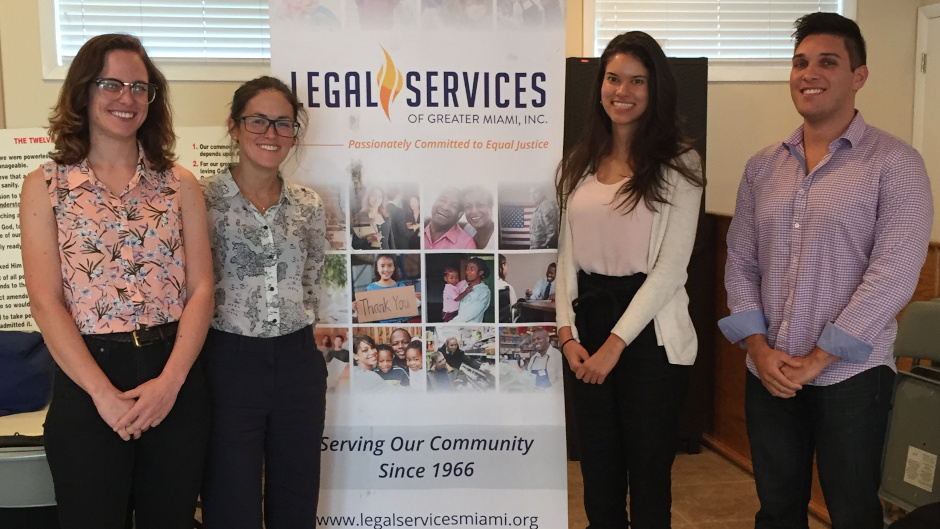After Hurricane Irma devastated South Florida, the HOPE Public Interest Resource Center, working with Miami Law's student-led Public Interest Leadership Board, was determined to create opportunities for law students to help impacted communities.
Thanks to funding from LAFAC (Law Activity Fee Allocation Committee), the SBA and donations, HOPE was able to partner with Legal Services of Greater Miami and Florida Rural Legal Services to send ten students on Legal Advocacy Alternative Spring Breaks.
Four Students Offer Legal Advocacy to Irma-Impacted Florida Keys
The Florida Keys were hit especially hard by the hurricane. As one of the only providers of civil legal services in the Keys, LSGMI established roving disaster relief clinics throughout the Keys for spring break, bringing legal services to many residents. After two days of training and observing at LSGMI’s offices in Miami, the four participating students were eager to conduct these clinics and take on this rewarding experience in the Keys.
Miami Scholars Amelia Daynes and Katrina Tomas were participants with 2L Tomas leading the trip. “We serviced Key Largo, Marathon, and Key West,” said Tomas. “Although we did handle many cases that resulted from direct consequences of Hurricane Irma, such as FEMA insurance coverage and property damage issues, many clients came with issues going beyond the expected.
"Divorce, domestic violence, public benefits denials, and unemployment were a few examples of the many issues we encountered. Throughout the trip, we were able to truly engage in direct client service work and help address the needs of a vulnerable, low-income community. This trip was really enjoyable and a wonderful learning opportunity.”
“Going down to the Keys with Legal Services was an incredible opportunity,” said 1L Thomas Alberts. “Overall, it was a great experience putting some of the things we have learned in law school into practice and I would not hesitate to sign up for an Alternative Spring Break again!”
Rural Communities in Central Florida Given Legal Assistance
Six law students traveled to Fort Myers and spent the week volunteering with Florida Rural Legal Services where they were exposed to a wide range of civil legal issues. Lee County, where Fort Myers is located, was another region hard-hit by Irma.
FRLS, founded in 1966, has a rich history of serving migrant farm workers and other low-income individuals throughout Central Florida. Students worked on housing law issues, assisted with self-help clinics at the local courthouse, observed court proceedings, assisted with research and drafting for cases in the office, and traveled to a migrant farm workers camp to help ensure farm workers were aware of their rights.
2L Miami Scholar Thomas Voracek led the efforts to partner with FRLS this year. “I was very happy to go to Fort Myers over spring break and be exposed to the various and diverse aspects of civil legal aid service that they handle and contribute in my small part to their work,” said Voracek.
“Being able to lend my experience working on public benefits cases with the Miami Law Health Rights Clinic to FRLS' work was gratifying and rewarding - I hope that my work will help some of their clients, particularly through the federal brief that I helped write for a Social Security appeal.”
“From working on evictions, to observing county court proceedings, to helping educate migrant farmworkers on their contract rights, our experience with FRLS provided an eye-opening glimpse into the realities facing other parts of our state,” said 1L Miami Scholar Julie Hochsztein.
Daniel Cruz, the managing attorney of FRLS’s Fort Myers Office, agreed that the week was a positive experience. “I would say that the partnership for the spring break session was successful because the students had the opportunity to do hands-on legal work… and they learned about legal services and the plight of the farmworker and need for access to justice. For us, we were able to get some well needed legal assistance, we fostered interest in public service and legal aid, and we began a new community partnership with the University.”
Hurricanes and Beyond -- Continued Commitment to Helping the Underserved
“In the wake of the hurricanes, HOPE was committed to sending students to work on legal issues in affected regions over spring break and we will continue to offer our support through HOPE Fellows and SPIF summer placements,” said Marni Lennon, Assistant Dean of Public Interest & Pro Bono and the Director of the HOPE Public Interest Resource Center.
In collaboration with community agencies locally, nationally, and internationally, Miami Law hopes to continue to grow their alternative spring break programming in the coming years and recognizes the impact that hands-on experience has on both law students and the community.
“We are so appreciative of the generous donations in support of our Legal Advocacy Alternative Spring Breaks,” said Lennon. “Without our community partners, the SBA, LAFAC and HOPE donors, we would not have been able to send two teams of students to engage in hands-on service and advocacy over spring break.”
Interested in working to develop upcoming opportunities? Email umhope@law.miami.edu.
To support alternative break initiatives, please consider making a donation.

